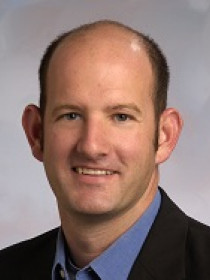
Joshua F.J. Inwood
Associate Professor of Geography, The Rock Ethics Institute, Pennsylvania State University
Chapter Member: Central Pennsylvania SSN
Areas of Expertise:
Connect with Joshua
About Joshua
Inwood’s research interests center on race, racism, peace and justice studies. His overall goal is to integrate critical theory with empirically grounded analyses of key social issues, especially those pertaining to structural inequality, racialized violence, and social difference. Inwood writes on U.S. based truth commissions, white supremacy, urban geography and cultural geography.
Contributions
No Jargon Podcast
In the News
Joshua F.J. Inwood quoted on understanding segregation in the American south by Jesse Westbrook, "NSF Grant Supports Research into Geospatial Intelligence during Civil Rights Era" Penn State News, July 18, 2017.
"Why Taking Down Confederate Memorials is Only a First Step," Joshua F.J. Inwood (with ), The Conversation, June 4, 2017.
"Dealing with Hate: Can America’s Truth and Reconciliation Commissions Help?," Joshua F.J. Inwood, The Conversation, February 28, 2017.
"Why a Fractured Nation Needs to Remember King’s Message of Love," Joshua F.J. Inwood, The Conversation, November 15, 2016.
Joshua F.J. Inwood quoted on Trump's role in surfacing America's latent racism by Patrik Jonsson, "Why So Much Blatant Racism is Bubbling to the Surface" Christian Science Monitor, October 9, 2016.
"How Grassroots Truth and Reconciliation Commissions Can Help Activists to Reclaim Their Communities and Advance Social Justice.," Joshua F.J. Inwood (with ), London School of Economics U.S. Centre Blog on American Politics and Policy, June 17, 2016.
Joshua F.J. Inwood quoted on political activism on college campuses by Yamiche Alcindor, "University of Missouri Unrest a Signal for Other Schools, Experts Say" USA Today, November 11, 2015.
"Make Civil Rights a Geography Awareness Week Theme," Joshua F.J. Inwood (with ), Association of American Geographers, July 30, 2015.
"MLK's Plan: Applying Standards of Nonviolence to All," Joshua F.J. Inwood (with ), Knoxville Mercury, May 6, 2015.
"Wendell Scott Deserves Spot in NASCAR Hall of Fame," Joshua F.J. Inwood (with ), The Tennessean, May 18, 2014.
Guest to discuss the National Football League and race on WATE Local Knoxville News, Joshua F.J. Inwood, February 27, 2014.
Guest to discuss the life and legacy of Martin Luther King Jr. on KPFK Scholars Circle, Joshua F.J. Inwood, January 19, 2014.
Joshua F.J. Inwood quoted on Nelson Mandela’s life and legacy, "Nelson Mandela Dies: African Leader's Legacy Great, UT Pair Say" Knoxville News-Sentinel, December 6, 2013.
"What’s So Funny about Peace, Love and Understanding, Anyway? A Response to Joel Wainwright (and with Apologies to Elvis Costello)," Joshua F.J. Inwood (with ), Antipode Foundation, October 15, 2013.
Joshua F.J. Inwood quoted on Martin Luther King’s life and legacy, "Seeking 'A Better Way:' Knoxvillians Reflect on Dr. King's Legacy, Obama's Second Term" Knoxville News-Sentinel, January 20, 2013.
"Guns and Geography: Rights, Rhetoric and Regulations," Joshua F.J. Inwood (with ), Association of American Geographers Newsletter, 2011.
Joshua F.J. Inwood's research on the legacies of racial violence in the American South discussed by "Truth and Reconciliation Revisited," Carolina Peacemaker, February 24, 2011.
Publications
"NonKilling Geography," (with ), Center for Global NonKilling, 2011.
Explores the implications of nonviolence for broader political and the creation of a nonkilling society. Questions killing, violence and nonviolence.
"Neoliberal Racism: The 'Southern Strategy' and the Expanding Geographies of White Supremacy" Journal of Social and Cultural Geography (2015): 1-17.
Examines the U.S. based Southern Strategy, an electoral scheme that created conditions that resurrected a broadly conservative agenda in the U.S. Connects the Southern Strategy with a broad economic argument and crystallizes the role race plays in the development of the U.S. political economy as well as implications for understanding the way race and capitalism in the USA are co-constituted with one another.
"Contextualizing the State Mode of Production in the United States: Race, Space and Civil Rights" Environment and Planning A 45 (2013): 2120-2134.
Argues the need to see the U.S. civil rights movement in a broader economic framework and that the U.S. civil rights movements failures to fundamentally address economic inequalities points to the limitations of social-democratic movements to fully address economic inequality. Discusses economic inequality in the wake of current debates in the U.S. around issues of income inequality and the concentration of wealth.
"Righting Unrightable Wrongs: Legacies of Racial Violence and the Greensboro Truth and Reconciliation Commission" Annals of the Association of American Geographers 102 (2012): 1450-1468.
Explores the USA's first ever Truth and Reconciliation Commission (TRC) and exposes the connections between the memory of violence and continuing structural inequalities. Offers an analysis of violence and community efforts to address violence through nonviolent organizing.
"The Politics of Being Sorry: The Greensboro Truth Process and Efforts at Restorative Justice" Social and Cultural Geography 13 (2012): 607-624.
Examines the Greensboro Truth Commission and focuses on the process of restorative justice as well as broader discussions of the Right to the City. Discusses how the Greensboro truth commission engages with notions of right to the city activism that challenges white privilege and the legacies of white supremacy in the U.S.